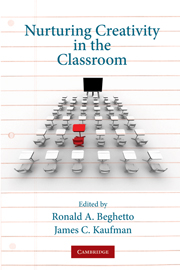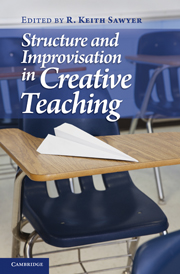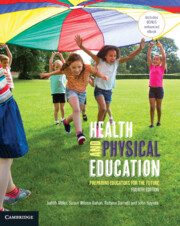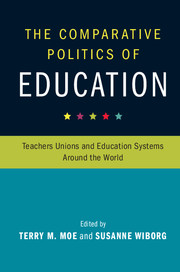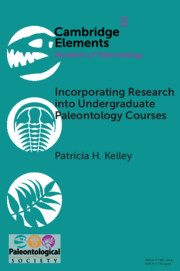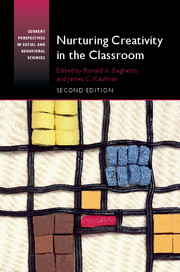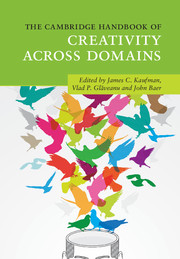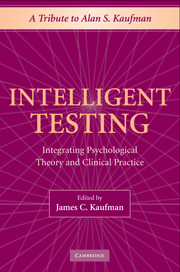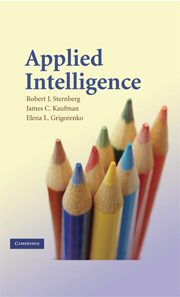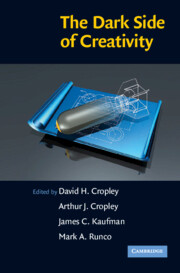Nurturing Creativity in the Classroom
- Editors:
- Ronald A. Beghetto, University of Oregon
- James C. Kaufman, California State University, San Bernardino
- Date Published: February 2012
- availability: This ISBN is for an eBook version which is distributed on our behalf by a third party.
- format: Adobe eBook Reader
- isbn: 9781139200325
Find out more about Cambridge eBooks
Adobe eBook Reader
Looking for an examination copy?
This title is not currently available for examination. However, if you are interested in the title for your course we can consider offering an examination copy. To register your interest please contact [email protected] providing details of the course you are teaching.
-
Nurturing Creativity in the Classroom is a groundbreaking collection of essays by leading scholars, who examine and respond to the tension that many educators face in valuing student creativity but believing that they cannot support it given the curricular constraints of the classroom. Is it possible for teachers to nurture creative development and expression without drifting into curricular chaos? Do curricular constraints necessarily lead to choosing conformity over creativity? This book combines the perspectives of top educators and psychologists to generate practical advice for considering and addressing the challenges of supporting creativity within the classroom. It is unique in its balance of practical recommendations for nurturing creativity and thoughtful appreciation of curricular constraints. This approach helps ensure that the insights and advice found in this collection will take root in educators’ practice, rather than being construed as yet another demand placed on their overflowing plate of responsibilities.
Read more- Provides practical insights for everyday teachers hoping to nurture creativity in their everyday curriculum
- Focuses on nurturing student creativity while still adhering to curricular constraints
- Focuses on nurturing the creativity of all students (as opposed to only 'gifted' or 'talented' students)
Reviews & endorsements
"What do leading scholars and researchers in the field of creativity think about developing creativity in the classroom? This fascinating book offers practical advice and concrete suggestions from many different perspectives and addresses a number of important questions. How does brainstorming in the classroom increase content knowledge? What are ‘ideal acts’ of learning? How do you combine creative and critical thinking in the curriculum? Beghetto and Kaufman in their excellent synthesis offer twenty key points about nurturing creativity in the classroom. This book is a very valuable addition to the field of creativity and education."
– Sandra Russ, Case Western Reserve University
See more reviews“Nurturing Creativity in the Classroom is an essential addition to the library of anyone involved in education who cares about fostering student creativity. The chapters present the most current views of the foremost scholars in creativity and learning, with clear and readable syntheses of potential problems and pitfalls, contrasted with pointers and good practices to ensure that classrooms are vibrant homes to creativity. Own it, read it, and embrace the twenty key points listed in the Creativity in the Classroom Coda.”
– Lisa F. Smith, University of Otago - College of Education, New Zealand
“Ronald Beghetto and James Kaufman invited a diverse group of scholars to discuss in writing their most rigorous and cutting-edge ideas on the topic of classroom creativity. The results are refreshingly counter-intuitive. The book’s recurring themes emphasize that developing student creative thinking requires expert guidance and role modeling in disciplined thought processes, persistence, deep content knowledge and risk taking within realistic constraints. By way of engaging language rich with examples, these chapters offer evidence-based advice on experiences that elicit creativity on the part of children, including suggestions for optimal timing, conditions, and purposes for these activities.”
– Rena F. Subotnik, Director, Center for Psychology in Schools and Education, American Psychological Association
"....Nurturing Creativity in the Classroom provides an important service through chapters that challenge long-standing, assumed dichotomies in American education.... Nurturing Creativity in the Classroom also includes two well-written articles about education for gifted students.... presents a broad view of the state of creativity research...."
– Michael Hanson, Teachers College Record
"....Nurturing Creativity in the Classroom is a creative landmark in its unique and revolutionary way of reconceptualizing creativity in its relation to academic learning and in creative learning strategies that may be incorporated with standard methods of learning in the classroom. Its purpose to initiate change in how creativity is perceived, received, and implemented in the classroom setting is lofty, given the predominant emphasis on basic academic learning standards.... the scientist–practitioner approach to content should enhance the value of the book for educators, school psychologists, educational psychologists, and other professionals (practitioners and researchers) interested in creativity and the learning process.... academic and creative brothers can finally embrace."
– Giselle B. Esquivel, PsycCRITIQUESCustomer reviews
Not yet reviewed
Be the first to review
Review was not posted due to profanity
×Product details
- Date Published: February 2012
- format: Adobe eBook Reader
- isbn: 9781139200325
- contains: 18 b/w illus. 20 tables
- availability: This ISBN is for an eBook version which is distributed on our behalf by a third party.
Table of Contents
1. How to discourage creative thinking in the classroom Raymond S. Nickerson
2. Teaching for creativity in an era of content standards and accountability John Baer and Tracey Garrett
3. Developing creative productivity in young people through the pursuit of ideal acts of learning Joseph S. Renzulli and Catharina F. de Wet
4. Creativity: a look outside the box in classrooms Alexinia Young Baldwin
5. Using constraints to develop creativity in the classroom Patricia D. Stokes
6. Infusing creative and critical thinking into the curriculum together Elizabeth Fairweather and Bonnie Cramond
7. The five core attitudes, seven I's, and general concepts of the creative process Jane Piirto
8. Learning for creativity R. Keith Sawyer
9. Broadening conceptions of creativity in the classroom Ronald A. Beghetto and James C. Kaufman
10. Everyday creativity in the classroom: a trip through time with seven suggestions Ruth Richards
11. Education based on a parsimonious theory of creativity Mark A. Runco
12. Roads not taken, new roads to take: looking for creativity in the classroom Thomas Skiba, Mei Tan, Robert J. Sternberg and Elena L. Grigorenko
13. Creativity in mathematics teaching: a Chinese perspective Weihua Niu and Zheng Zhou
14. Possibility thinking and wise creativity: educational futures in England Anna Craft
15. When intensity goes to school: overexcitabilities, creativity, and the gifted child Susan Daniels and Michael M. Piechowski
16. Intrinsic motivation and creativity in the classroom: have we come full circle? Beth A. Hennessey
17. Attitude change as the precursor to creativity enhancement Jonathan A. Plucker and Gayle T. Dow
18. Creativity in college classrooms Diane F. Halpern
19. Teaching for creativity Robert J. Sternberg
20. Creativity in the classroom coda:
20 key points and other insights James C. Kaufman and Ronald A. Beghetto.
Sorry, this resource is locked
Please register or sign in to request access. If you are having problems accessing these resources please email [email protected]
Register Sign in» Proceed
You are now leaving the Cambridge University Press website. Your eBook purchase and download will be completed by our partner www.ebooks.com. Please see the permission section of the www.ebooks.com catalogue page for details of the print & copy limits on our eBooks.
Continue ×Are you sure you want to delete your account?
This cannot be undone.
Thank you for your feedback which will help us improve our service.
If you requested a response, we will make sure to get back to you shortly.
×
